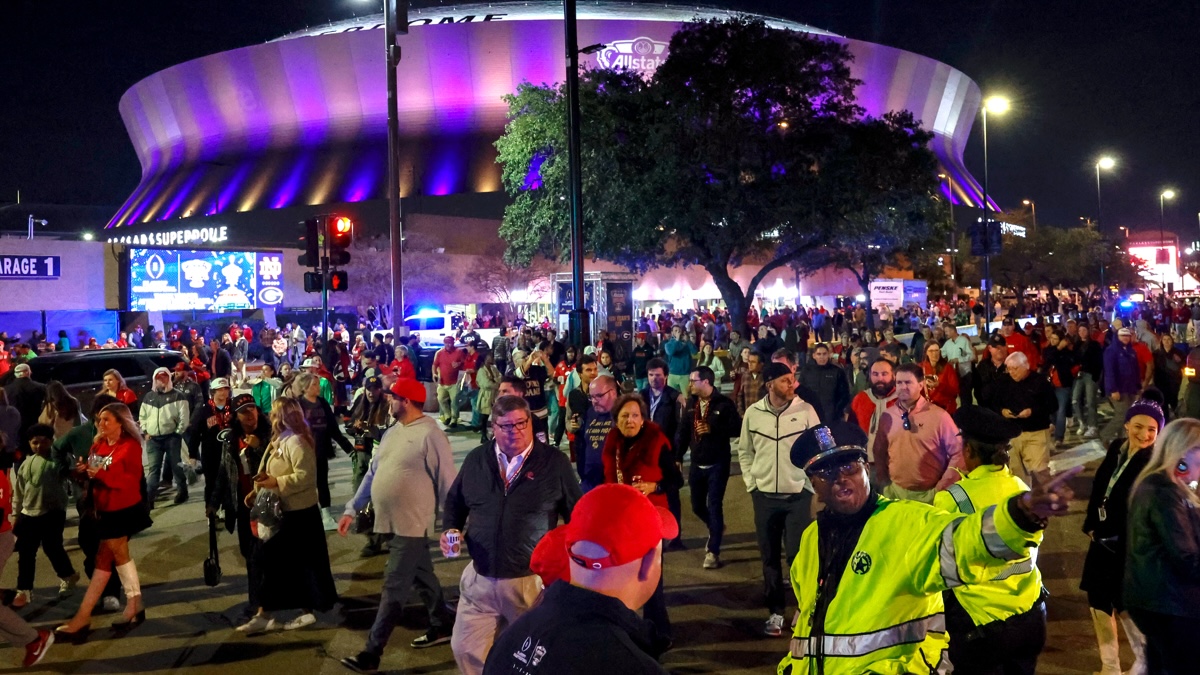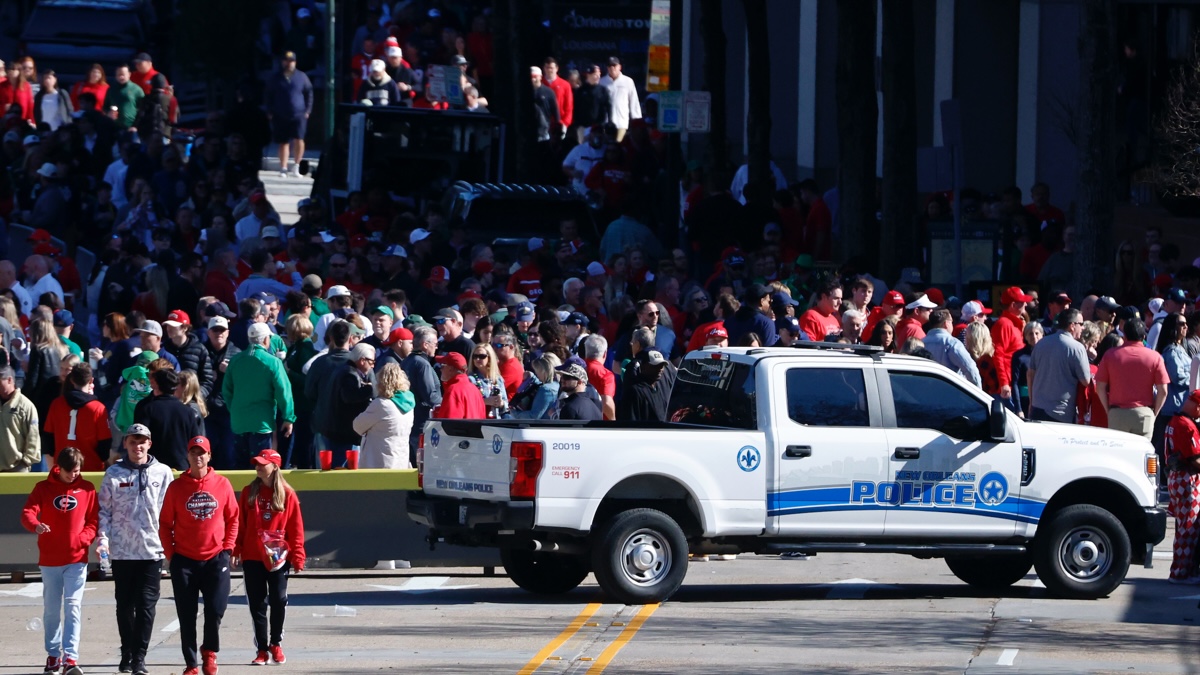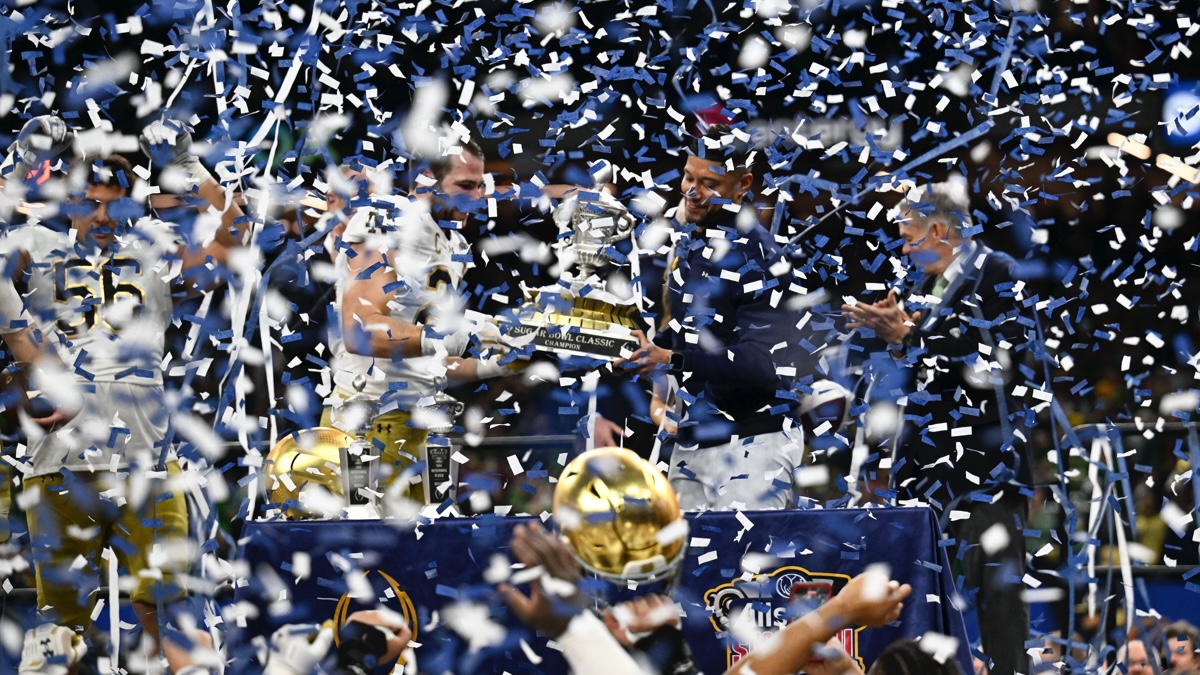
As Jeff Hundley stepped out of the shower at his downtown New Orleans hotel at 4:30 a.m. on January 1, his wife told him to turn on the television.
“I ran to the TV and saw what was going on,” Hundley said. “I quickly got to our office in the Superdome and at about 6:00 my phone rang from a Baton Rouge number that I didn’t recognize. I figured I’d better answer it — and turns out it was the governor.”
With that, the next 48 hours became a whirlwind for the chief executive officer of the Sugar Bowl. A deadly terrorist attack had taken place on Bourbon Street in the early hours of New Year’s Day as a driver plowed into a crowd of New Year’s revelers, killing at least 14 people and injuring dozens more.
Sponsored Content
The attack came hours before two of the heavyweights in college football, Notre Dame and Georgia, were to meet in a College Football Playoff quarterfinal at 7:45 p.m. local time on January 1, thrusting the Sugar Bowl and city of New Orleans into a blender of emotion and uncertainty as the FBI, state and local law enforcement converged on the area.
“Five minutes after my phone rang, I was meeting with the governor, who was providing all the details that they had at that point in time and looking for a delay up to 48 hours for the game,” Hundley said. “The amount of law enforcement in town was enough to conduct the game, but it wasn’t enough to investigate the crime and conduct the game.”
While waiting for reinforcements from the FBI, DEA, National Guard and state police, Hundley and his team spent the next several hours on the phone with representatives from Notre Dame and Georgia, the management of the College Football Playoff, the Southeastern Conference and ESPN.
“You can imagine with that many cooks in the kitchen, there were a lot of different opinions on when, and if, and how the game should be played,” Hundley said. “The spectrum was broad and included everything from playing that day to delaying 48 hours, and I won’t go into any more detail than that. But arriving at a consensus wasn’t necessarily easy.”
In addition to “cooks in the kitchen,” there was a large menu of issues to work through once it was decided that the game would be moved; the initial announcement was that the game would be postponed to January 2, then later it was announced the game would kick off at 4 p.m. local time.
Adjusting on the Fly
The early kickoff time on January 2 was a sporting matter. Penn State had won its quarterfinal against Boise State on New Year’s Eve. The CFP committee did not want the Sugar Bowl winner to have much more of a disadvantage to prepare for the semifinals (Notre Dame beat Penn State and will play Ohio State in Monday’s title game in Atlanta).
Once the kickoff time was settled, the next hurdle was to make sure there was enough staff at the Caesars Superdome. Hundley met with Doug Thornton and Evan Holmes of ASM Global, the company that manages the Superdome. All parties agreed that gameday staff would receive time-and-a-half holiday pay to incentivize people to come. Ultimately, they had the same staffing turnout that they would have had a day earlier.
“Doug and Evan did a great job,” said Hundley, CEO of the Sugar Bowl since 2019. “They had an event that was scheduled to move in (January 2) so they had to work through postponing that. And with it being an afternoon game, they weren’t sure if they were going to be able to get ticket takers, ushers, what have you, because those people have day jobs.”

Another logistical question was hotel reservations. The teams were staying at the Hilton Riverside and the New Orleans Marriott, with the Sheraton hosting the media.
“We contacted all three of those right away because we weren’t sure about their availability,” Hundley said. “A lot of years, there’ll be a convention moving in as the Sugar Bowl fans are leaving, so we checked with our partner hotels and they fortunately had availability to extend everybody a day. Sometimes it’s better to be lucky than good.”
New Orleans Rallies to Create Special Atmosphere
The postponement allowed plenty of law enforcement to arrive in New Orleans to secure both the crime scene and the rest of the city as Notre Dame’s and Georgia’s fan bases made their way to the Superdome. Attendance was announced at 57,267 at the stadium, which holds more than 70,000 for football; the postponement led to more than 20,000 tickets entering the secondary market as fans who couldn’t stay the extra day headed home.
“We were worried that there were going to be gaping holes in the stadium crowd,” Hundley said. “But that didn’t happen on game night. That tells me the locals rallied and maybe some people who were initially concerned got comfortable enough to go. But I think it was a big part of the local community that showed up for the game.”
The Sugar Bowl changed programming before the start of the game to include an elongated moment of silence, followed by a prayer and a national anthem performance that had the crowd chanting “U-S-A, U-S-A.”
“It was really the kind of stuff that raised goosebumps on my arms and I’ll be honest, I shed a tear or two,” Hundley said. “It was just that emotional.”

Hundley has lived in New Orleans for over three decades and says communication is the most important aspect in any rapid development when organizing an event.
“We didn’t stop being on the phone and had plenty of face-to-face meetings,” he said. “What could have been a really chaotic situation ended up being as successful as it could and the entire community really pulled together. There was no panic, just level heads prevailing.”
To prevail is also not a one-person job. Hundley got about two hours of sleep total during the whirlwind 48-hour period along with a staff that worked around the clock.
“They all did a great job,” he said. “Hardly anybody slept. But the game came off well and we all feel good about it. We were able to carry on and we did so in a safe and appropriate manner that showed the proper reverence for what had taken place.”
After the ordeal the city has been through, it now turns to the busiest period the city has ever seen from an events perspective. Super Bowl LIX will be held on February 9, followed by Mardi Gras starting March 4. Each day, Hundley looks out the window from his office at the Superdome and can feel the buzz beginning to crescendo.
“This is an extremely resilient community,” he said. “I’ve lived here 31 years now and have seen it time and again. I think everybody that I’m talking to right now is looking forward to and excited about the challenge and the opportunity to prove to the rest of the world that New Orleans is the best major event city in this country.”












 Copyright © 2025 by Northstar Travel Media LLC. All Rights Reserved. 301 Route 17 N, Suite 1150, Rutherford, NJ 07070 USA | Telephone: (201) 902-2000
Copyright © 2025 by Northstar Travel Media LLC. All Rights Reserved. 301 Route 17 N, Suite 1150, Rutherford, NJ 07070 USA | Telephone: (201) 902-2000